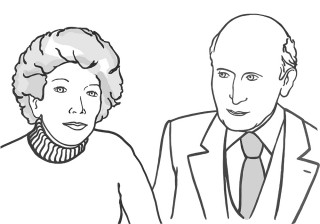Title
Subhead

Nina and Daniel Carasso
Nearly 90 percent of Juilliard students qualify for scholarship support. This is the story behind one of the 15 new permanently endowed scholarship funds that Juilliard welcomed this year.
Body
Yogurt is so ubiquitous—dozens of varieties crowd supermarket shelves around the world—that it's hard to fathom that not long ago it was a humble food little-known in the West. It took the marketing genius of entrepreneur—and longtime Juilliard benefactor—Daniel Carasso to make yogurt the popular and enduring part of the international diet that it is today.
In 1916, Carasso's father, Isaac, became distressed by the number of children suffering from intestinal diseases in Spain, where the family was living. Following macrobiotic theories, he used cultures developed at the Pasteur Institute, in Paris, to produce a yogurt that he called Danone, after his son's Catalan nickname. Daniel Carasso subsequently studied bacteriology and business in order to learn how to make and market yogurt on a countrywide, industrial scale. Danone was just starting to gain a foothold in France when the Nazis invaded in 1940, forcing Carasso and his wife, Nina, to flee to New York City.
Although the couple initially struggled here, the New York of that era seemed enchantingly modern and full of the jazz that Nina adored. Carasso found business partners in two family friends and began to produce yogurt marketed under the Americanized name Dannon. Growth was slow until, taking the measure of the sweets-loving American palate, Carasso added strawberry jam to the formula. Sales skyrocketed.
After the war ended, the Carassos returned to Europe with their daughter, Marina, and rebuilt the company under its original name, Danone. By 1973, after having merged with the French-based multinational BSN and gone into the bottled water and baby food markets, Danone had grown into a worldwide brand and one of the largest French food conglomerates.
President Joseph W. Polisi was introduced to the Carassos by trustee Louis Smadbeck and met them on several subsequent occasions, including during the Juilliard Orchestra's residency at the Evian Festival in 1992. Polisi remembers Daniel and Nina as “very elegant individuals who loved music and the young musicians of the Juilliard Orchestra.” As a result of this relationship, the Carassos made several scholarship gifts to Juilliard over the years.
Daniel Carasso died in 2009, two years after his wife, and Marina Nahmias established the Fondation Daniel et Nina Carasso to honor her parents' philanthropic interests. In addition to funding for the arts, the foundation also supports projects in sustainable agriculture and improvements in food systems. In 2012, Nahmias decided to pay tribute to her mother's love for music by pledging to fund a scholarship for an incoming Juilliard student from France for four years. Fittingly, given her love for jazz, the first Nina Carasso Scholarship was awarded to pianist Mathis Picard (BM '16, jazz studies). This generous grant was followed in 2014 by a scholarship for Spanish students studying at Juilliard.
Last year, the foundation decided to endow its scholarship with a gift of $1 million. The annual proceeds from this endowment will be given as scholarship support to French and Spanish music students. The current recipient is fourth-year trumpeter Max Morel, who told The Journal that it enabled him to not only study and perform at Juilliard, but also practice for the International Competition of the Moscow Conservatory for Performers on Wind and Percussion—he won second prize—and for the Girolamo Fantini International Trumpet Competition in Rome (the finals are this month). “Without the generous support of the Fondation Daniel et Nina Carasso, I wouldn't have been able to take advantage of any of these opportunities,” Morel, who's from Ivry-sur-Seine, a Paris suburb, told The Journal. “I'm incredibly grateful.”




